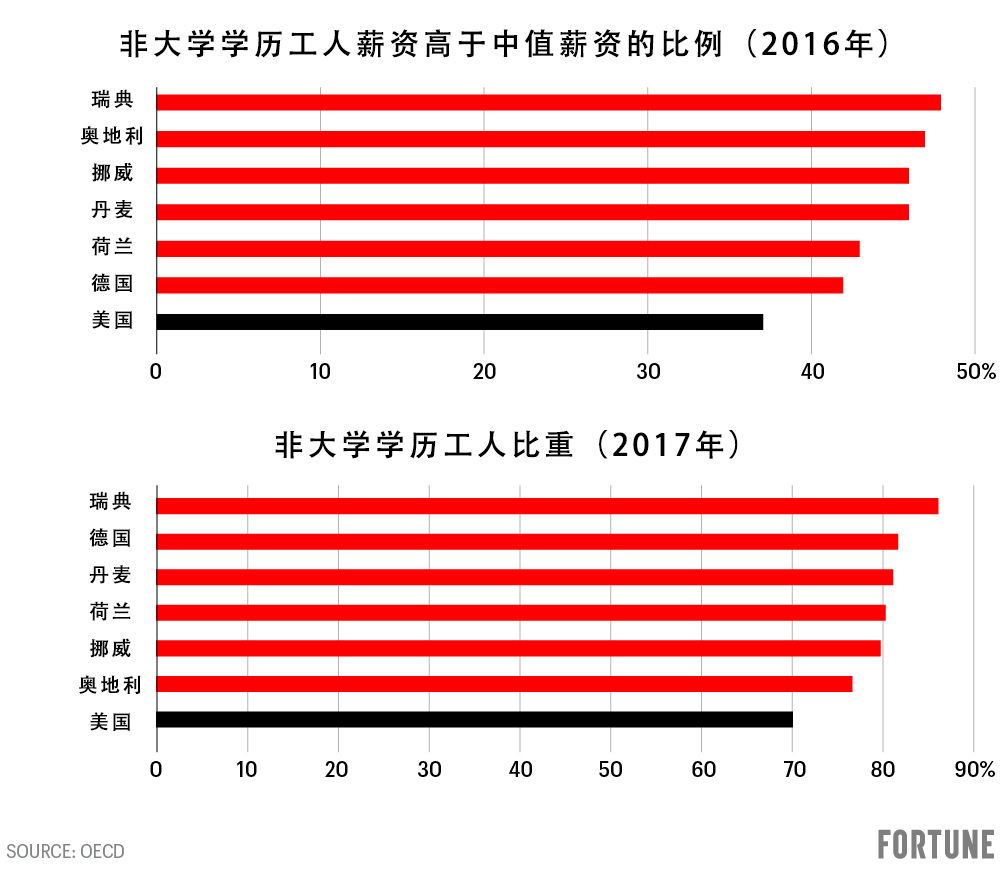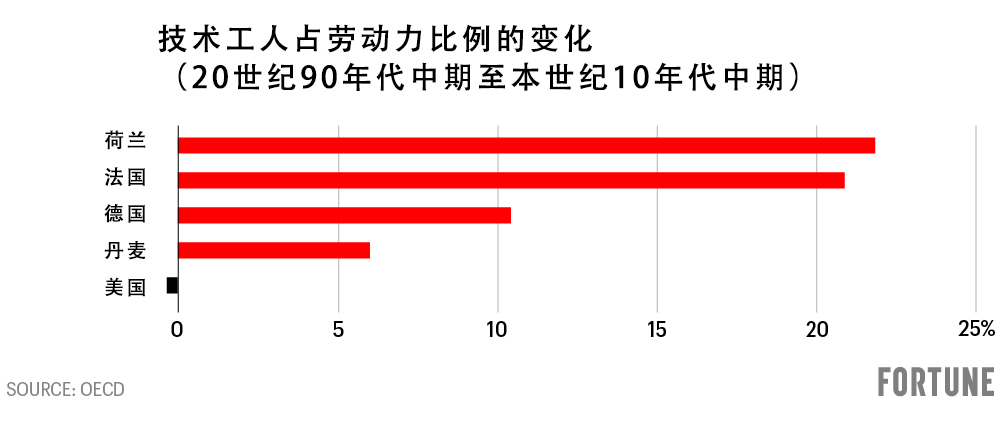
美国的大部分劳动力都是高中毕业,没有大学文凭。从财务上来讲,他们已经落后了超过一代人:其实际薪资中值自1979年以来下跌了12.3%,而持有大学文凭人士的薪资中值则增长了14.4%。总体来讲,如今只有不到三分之一的劳动力在没有大学文凭的情况下能够拿到全美中值水平的薪资。
在美国总统的竞选中,总统继任者乔•拜登承诺通过出台改变企业行为的政策,为这一群体提供帮助。拜登公开承认,企业董事会对美国工人阶层的困境负有责任。至于拜登是否可以兑现这一承诺,则取决于他是否能够有效地改善美国企业董事会对企业的治理,也就是要求公司在董事会为工人设立相应的席位。
企业董事会与工资压迫
自里根时代起,美国董事会的一项核心操作就是通过工资压迫来实现股份价值的最大化。这种股东资本主义的特征包括将公司内部的劳资谈判进行外包或对其进行破坏(自几十年前美墨联营工厂时期开始),并将高薪工作转移给墨西哥和亚洲的低薪资制造商。
这一模式的替代模式就是利益相关者资本主义(stakeholder capitalism)。其中,企业董事会会出台有利于当地社区、雇员以及股东的政策。拜登在今年7月的演讲中表示赞成利益相关者资本主义。然而,他对北欧富裕民主国家用于实现利益相关者资本主义的机制闭口不提。经济学家将这一机制称之为共同决定(Codetermination)。在共同决定机制中,管理层和工人会围绕决策开展合作,尤其是通过工人代表进驻董事会这种形式。
少数党领袖查尔斯•舒默和其他13名民主党参议员对共同决定制表示了赞同,而且认为理当如此:在改善非大学学历工人以及其他利益相关方经济状况方面,这已经被证明是唯一行之有效的资本主义形式。就像其在北欧发挥的作用那样,拜登政府采用共同决定制的举措可以把美国企业董事会从美国工人阶层的捕食者转变为支持者。
北欧工人阶级的复兴
之所以北欧国家(而非美国)能够打造高薪工作岗位,并成功地让非大学学历男性和女性职员融入其国家经济,共同决定制功不可没。经合组织(OECD)称,北欧这一群体工人的薪资相对于美国更加接近其全国的中值水平。2017年,这一群体在北欧国家的就业率达到了80%至85%,而同年美国的比例仅有70%。

北欧富裕国家在过去半个世纪中实施了利益相关者资本主义,并进行了共同决定制的改革,要求公司董事会中要有较大比例的董事代表雇员和当地社区的利益。例如在德国约2000家最大的公司中,50%的董事都由雇员选出,而不是股东。在这些大型公司中——包括像阿迪达斯、拜耳、戴姆勒和意昂这样家喻户晓的公司,有半数的董事都是雇员代表。美国经济研究局(National Bureau of Economic Research)的多项分析亦证实,共同决定制会造福雇员以及企业的投资和利润。
几十年以来,共同决定制一直都被证明是美国式工资压迫的一个系统化、市场化的补救措施。世界大型企业联合会(Conference Board)称,这也是为什么德国及其北欧邻国的薪资要高于美国的原因。此外,这一政策也导致北欧的很大一部分产出源于自身不带有高薪工作岗位的技术工人。德国排名前30的企业(DAX 30的成员企业)在德国销售的产出仅占其全球的21%,但其全球36%的劳动力都集中在德国。例如,戴姆勒在德国的销售额仅占其全球总额的15%,但其全球超过一半的员工都在德国。大众的这个比例仅有9%,但其全球40%的员工都在德国。
反向前进的劳动力
实施共同决定制的企业董事会专注于高生产力产品线,它要求大幅提升公司内部劳动力的劳动技能。因为荷兰(37%)等北欧各国受高等教育员工的比重要远低于技术工种的从业人员比重(53%),因此各大企业会深入挖掘非大学学历男性和女性员工,并对其进行技能升级培训。
经合组织称,这一点与美国习惯性的企业工资压迫举措形成鲜明对比,而该举措导致了美国被视为“技术工种”的工作岗位数量在20世纪90年代中期到本世纪10年代中期出现了下滑。然而,这类工作的比重在每一个北欧国家都出现了大幅增长,其中,荷兰高达21.8%,法国高达20.8%。早在2006年初,北欧各国的这一比重均超过了美国(39%),其中挪威为48%,德国44%,荷兰53%。尽管硅谷为美国提供了令人羡慕的优势,而且美国在全球信息产业占据着主导地位,但这个转型依然发生了。

更糟糕的是,美国董事会对工人的降级是系统性的:就在技术工种工作数量出现下降的同时,美国这一期间所有被划分为低技能工作岗位的数量增长了3.3%。作为对比,海外采用共同决定制的企业则在减少低薪资工作:例如,荷兰公司内部低技能员工的比例下降了7.8%,法国下滑了6.4%。
强化员工将带来政治优势
除了经济方面的因素外,拜登政府的共同决定动议亦符合其在本国的政治考虑。首先,该动议回应了民主党拥趸的期许,即民主党会优先实施那些可以造福经济落后群体的政策。除了提升最低薪资上限、更加有力的劳资谈判以及大学身债务减免之外,共同决定制能够赋予民主党的核心支持者——年收入低于10万美元的人群、工会成员、少数族裔和青年,更多的机会。其中很多人都受到了新冠疫情的严重冲击。
第二,共同决定制将成为一座桥梁,拉拢一部分重点关注经济而不是移民、法律与秩序或多台等社会问题的特朗普支持者。这部分人群当然还包括诸多经济状况较差的非大学学历男性和女性职员,他们中的很大一部分在11月的美国总统大选中成为了特朗普的支持者,而且这部分人群的规模是可观的。独立的投票后民调显示,经济是影响特朗普支持者最重要的因素,或仅次于反恐。总体来说,35%的选民将经济视作其支持某位候选人的首要考量因素,在这些选民当中,83%选择支持了特朗普。实施共同决定制之后带来的一系列影响,包括薪资的提升、工作岗位海外转移的终止以及更好的就业,必将提升这些人的生活水平。
拜登对美国工人阶层以及扩张民主党承诺的真正考验将是其是否愿意支持共同决定制。拜登支持用事实说话的医疗科学。他也应该运用这一用事实说话的经济学,来解决非大学学历美国民众所处的困境。
共同决定制是改善工人阶层经济状况最有利的资本主义机制。它可以巩固市场资本主义。它也是唯一获得证实,能够提供更多机会,减少经济不公平性的方式,因为它可以让非大学学历男性和女性职员融入美国主流经济当中。
总统继任者拜登应该把握这个机会。(财富中文网)
乔治•泰勒此前曾经担任美国副助理财政部长和世界银行(World Bank)的官员。他的书作包括《亿万富翁民主》(Billionaire Democracy)和《出了什么问题》(What Went Wrong)。
译者:冯丰
审校:夏林
美国的大部分劳动力都是高中毕业,没有大学文凭。从财务上来讲,他们已经落后了超过一代人:其实际薪资中值自1979年以来下跌了12.3%,而持有大学文凭人士的薪资中值则增长了14.4%。总体来讲,如今只有不到三分之一的劳动力在没有大学文凭的情况下能够拿到全美中值水平的薪资。
在美国总统的竞选中,总统继任者乔•拜登承诺通过出台改变企业行为的政策,为这一群体提供帮助。拜登公开承认,企业董事会对美国工人阶层的困境负有责任。至于拜登是否可以兑现这一承诺,则取决于他是否能够有效地改善美国企业董事会对企业的治理,也就是要求公司在董事会为工人设立相应的席位。
企业董事会与工资压迫
自里根时代起,美国董事会的一项核心操作就是通过工资压迫来实现股份价值的最大化。这种股东资本主义的特征包括将公司内部的劳资谈判进行外包或对其进行破坏(自几十年前美墨联营工厂时期开始),并将高薪工作转移给墨西哥和亚洲的低薪资制造商。
这一模式的替代模式就是利益相关者资本主义(stakeholder capitalism)。其中,企业董事会会出台有利于当地社区、雇员以及股东的政策。拜登在今年7月的演讲中表示赞成利益相关者资本主义。然而,他对北欧富裕民主国家用于实现利益相关者资本主义的机制闭口不提。经济学家将这一机制称之为共同决定(Codetermination)。在共同决定机制中,管理层和工人会围绕决策开展合作,尤其是通过工人代表进驻董事会这种形式。
少数党领袖查尔斯•舒默和其他13名民主党参议员对共同决定制表示了赞同,而且认为理当如此:在改善非大学学历工人以及其他利益相关方经济状况方面,这已经被证明是唯一行之有效的资本主义形式。就像其在北欧发挥的作用那样,拜登政府采用共同决定制的举措可以把美国企业董事会从美国工人阶层的捕食者转变为支持者。
北欧工人阶级的复兴
之所以北欧国家(而非美国)能够打造高薪工作岗位,并成功地让非大学学历男性和女性职员融入其国家经济,共同决定制功不可没。经合组织(OECD)称,北欧这一群体工人的薪资相对于美国更加接近其全国的中值水平。2017年,这一群体在北欧国家的就业率达到了80%至85%,而同年美国的比例仅有70%。
北欧富裕国家在过去半个世纪中实施了利益相关者资本主义,并进行了共同决定制的改革,要求公司董事会中要有较大比例的董事代表雇员和当地社区的利益。例如在德国约2000家最大的公司中,50%的董事都由雇员选出,而不是股东。在这些大型公司中——包括像阿迪达斯、拜耳、戴姆勒和意昂这样家喻户晓的公司,有半数的董事都是雇员代表。美国经济研究局(National Bureau of Economic Research)的多项分析亦证实,共同决定制会造福雇员以及企业的投资和利润。
几十年以来,共同决定制一直都被证明是美国式工资压迫的一个系统化、市场化的补救措施。世界大型企业联合会(Conference Board)称,这也是为什么德国及其北欧邻国的薪资要高于美国的原因。此外,这一政策也导致北欧的很大一部分产出源于自身不带有高薪工作岗位的技术工人。德国排名前30的企业(DAX 30的成员企业)在德国销售的产出仅占其全球的21%,但其全球36%的劳动力都集中在德国。例如,戴姆勒在德国的销售额仅占其全球总额的15%,但其全球超过一半的员工都在德国。大众的这个比例仅有9%,但其全球40%的员工都在德国。
反向前进的劳动力
实施共同决定制的企业董事会专注于高生产力产品线,它要求大幅提升公司内部劳动力的劳动技能。因为荷兰(37%)等北欧各国受高等教育员工的比重要远低于技术工种的从业人员比重(53%),因此各大企业会深入挖掘非大学学历男性和女性员工,并对其进行技能升级培训。
经合组织称,这一点与美国习惯性的企业工资压迫举措形成鲜明对比,而该举措导致了美国被视为“技术工种”的工作岗位数量在20世纪90年代中期到本世纪10年代中期出现了下滑。然而,这类工作的比重在每一个北欧国家都出现了大幅增长,其中,荷兰高达21.8%,法国高达20.8%。早在2006年初,北欧各国的这一比重均超过了美国(39%),其中挪威为48%,德国44%,荷兰53%。尽管硅谷为美国提供了令人羡慕的优势,而且美国在全球信息产业占据着主导地位,但这个转型依然发生了。
更糟糕的是,美国董事会对工人的降级是系统性的:就在技术工种工作数量出现下降的同时,美国这一期间所有被划分为低技能工作岗位的数量增长了3.3%。作为对比,海外采用共同决定制的企业则在减少低薪资工作:例如,荷兰公司内部低技能员工的比例下降了7.8%,法国下滑了6.4%。
强化员工将带来政治优势
除了经济方面的因素外,拜登政府的共同决定动议亦符合其在本国的政治考虑。首先,该动议回应了民主党拥趸的期许,即民主党会优先实施那些可以造福经济落后群体的政策。除了提升最低薪资上限、更加有力的劳资谈判以及大学身债务减免之外,共同决定制能够赋予民主党的核心支持者——年收入低于10万美元的人群、工会成员、少数族裔和青年,更多的机会。其中很多人都受到了新冠疫情的严重冲击。
第二,共同决定制将成为一座桥梁,拉拢一部分重点关注经济而不是移民、法律与秩序或多台等社会问题的特朗普支持者。这部分人群当然还包括诸多经济状况较差的非大学学历男性和女性职员,他们中的很大一部分在11月的美国总统大选中成为了特朗普的支持者,而且这部分人群的规模是可观的。独立的投票后民调显示,经济是影响特朗普支持者最重要的因素,或仅次于反恐。总体来说,35%的选民将经济视作其支持某位候选人的首要考量因素,在这些选民当中,83%选择支持了特朗普。实施共同决定制之后带来的一系列影响,包括薪资的提升、工作岗位海外转移的终止以及更好的就业,必将提升这些人的生活水平。
拜登对美国工人阶层以及扩张民主党承诺的真正考验将是其是否愿意支持共同决定制。拜登支持用事实说话的医疗科学。他也应该运用这一用事实说话的经济学,来解决非大学学历美国民众所处的困境。
共同决定制是改善工人阶层经济状况最有利的资本主义机制。它可以巩固市场资本主义。它也是唯一获得证实,能够提供更多机会,减少经济不公平性的方式,因为它可以让非大学学历男性和女性职员融入美国主流经济当中。
总统继任者拜登应该把握这个机会。(财富中文网)
乔治•泰勒此前曾经担任美国副助理财政部长和世界银行(World Bank)的官员。他的书作包括《亿万富翁民主》(Billionaire Democracy)和《出了什么问题》(What Went Wrong)。
译者:冯丰
审校:夏林
A majority of the American labor force are high school graduates without college degrees. They have been falling behind economically for well more than a generation: Their median real wage has dropped 12.3% since 1979, while the median wage of those holding college degrees has increased 14.4%. Overall, barely one-third of those without college educations now earn the national median wage.
During the presidential campaign, President-elect Biden promised relief to this demographic group with policies to change corporate behavior. Biden is spot-on in acknowledging that corporate boardrooms are accountable for America’s working-class plight. His success in fulfilling that promise hinges on how effectively he upgrades boards' governance of U.S. corporations—by requiring them to give workers a seat at the table.
Corporate boards and wage suppression
A central practice of U.S. boards of directors since the Reagan era has been wage suppression to maximize share value. Characteristics of this shareholder capitalism include outsourcing and kneecapping collective bargaining at home while (since the maquiladora era decades ago) offshoring well-paying jobs to low-wage producers in Mexico and Asia.
The alternative to this model is stakeholder capitalism, where corporate boards pursue policies that benefit local communities and employees in addition to shareholders. Biden embraced stakeholder capitalism in a speech in July. But he was silent on the mechanism utilized by rich democracies of Northern Europe to effectuate stakeholder capitalism—a mechanism that economists call codetermination. In codetermination, management and workers cooperate in decision-making, especially through the representation of workers on boards of directors.
Minority Leader Charles Schumer and 13 other Senate Democrats have endorsed codetermination, and rightly so: It is the only version of capitalism proven effective in improving the economics of non-college workers along with other stakeholders. Just as it has in Northern Europe, a Biden administration embrace of codetermination can transform U.S. corporate boards from predators to advocates for working-class Americans.
Northern Europe’s working-class renaissance
Codetermination is why Northern European nations have succeeded where the U.S. has failed in creating high-wage jobs that successfully integrate non-college-educated men and women into their national economies. According to the OECD, the pay of workers in this demographic in Northern Europe is closer than that of their U.S. counterparts to national medians, and 80% to 85% of them were employed in 2017, compared to just 70% of American non-college workers that same year.
The rich democracies of Northern Europe over the last half-century have implemented stakeholder capitalism with codetermination reforms, requiring that a hefty portion of corporate directors represent the interests of employees and local communities. In Germany, for example, 50% of directors on the boards of the largest 2,000 or so firms are elected by employees, not shareholders. At these powerful firms, which include familiar names like Adidas, Bayer, Daimler and EON, half the board members are employee representatives. Multiple analyses, including by the National Bureau of Economic Research, have affirmed that codetermination advantages workers as well as enterprise investment and bottom lines.
Codetermination has proven over many decades to be a systemic, market-based remedy to U.S.-style wage suppression. It is why wages in Germany and its neighbors across Northern Europe are higher than U.S. wages, according to the Conference Board. Moreover, their policies have resulted in a disproportionate share of output across Northern Europe being produced by high-skill industries husbanding high-wage jobs at home. The 30 largest German corporations (members of the DAX 30) sell only 21% of their global output in Germany itself, but 36% of their global workforce is there. Only 15% of Daimler sales are German, for example, but more than half of its global workforce is there. And Volkswagen sells only 9% of its output in Germany, while 40% of its global workforce is there.
Workforces moving in opposite directions
The focus of codetermination-staffed corporate boards on high-productivity product lines has required the aggressive upskilling of domestic workforces. Because the share of college-educated workforces across Northern Europe in nations like the Netherlands (37%) is far smaller than the proportion of people employed in skilled job sectors (53%), corporations reach deep into the ranks of non-college-educated men and women for workers to upgrade.
This stands in sharp contrast with the U.S. Habitual corporate wage suppression caused the share of jobs considered “skilled” to decline in the U.S. between the mid-1990s and mid-2010s, according to the OECD. Yet the share of such jobs rose sharply in every Northern European economy, including a huge 21.8-percentage-point jump in the Netherlands and a 20.8-point leap in France. By as early as 2006, that share across all of Northern Europe, including Norway (48%), Germany (44%), and the Netherlands (53%), had surpassed the U.S. share (39%). That transformation occurred despite the enviable edge provided by Silicon Valley and the dominant U.S. role in global information technology.
Worse, the downgrading of U.S. workers by corporate boards is systemic: While the share of high-skill jobs dropped, the share of all U.S. jobs classified as low-skill increased 3.3 percentage points during this span. In contrast, codetermination corporations abroad shed low-wage jobs: The low-skill share of domestic workforces declined 7.8 percentage points in the Netherlands, for instance, and 6.4 percentage points in France.
Strengthening workers is good politics
Aside from economics, there are domestic political considerations warranting a Biden codetermination initiative. First, it responds to expectations from the Democratic Party’s most ardent supporters that the party will prioritize policies benefitting those who are economically lagging. Along with higher minimum wages, stronger collective bargaining, and college debt forgiveness, codetermination can enhance opportunity for those earning less than $100,000, union members, minorities, and youths—the party’s core, many of whom are being battered by the pandemic.
Second, codetermination is a bridge to that segment of Trump voters primarily concerned with economics rather than immigration, law and order, or social issues like abortion. That segment certainly includes numerous economically stressed non-college-educated men and women, a demographic overrepresented in U.S. counties that supported Trump in November. And it is sizable. Separate exit polling found that economics was either the most important issue influencing Trump voters, or second to fighting terrorism. Overall, 35% of voters named the economy as their top reason for selecting a candidate, and 83% of those voters voted for Trump. The characteristics that accompany codetermination—higher wages, ending job offshoring, and stronger employment—will certainly enhance their lives.
The true test of Biden’s commitments to America’s working class and expanding the Democratic Party will be his willingness to back codetermination. Biden lauds evidence-based medical science. He should apply evidence-based economics to the plight of non-college-educated Americans.
Codetermination stands alone as the most powerful mechanism of capitalism for improving working-class economics. It strengthens market capitalism. And it is the only option proven to expand opportunity and reduce economic inequality by reintegrating non-college-educated men and women into America’s economic mainstream.
President-elect Biden should seize the moment.
George Tyler is a former deputy assistant treasury secretary and World Bank official. He is the author of books including Billionaire Democracy and What Went Wrong.






